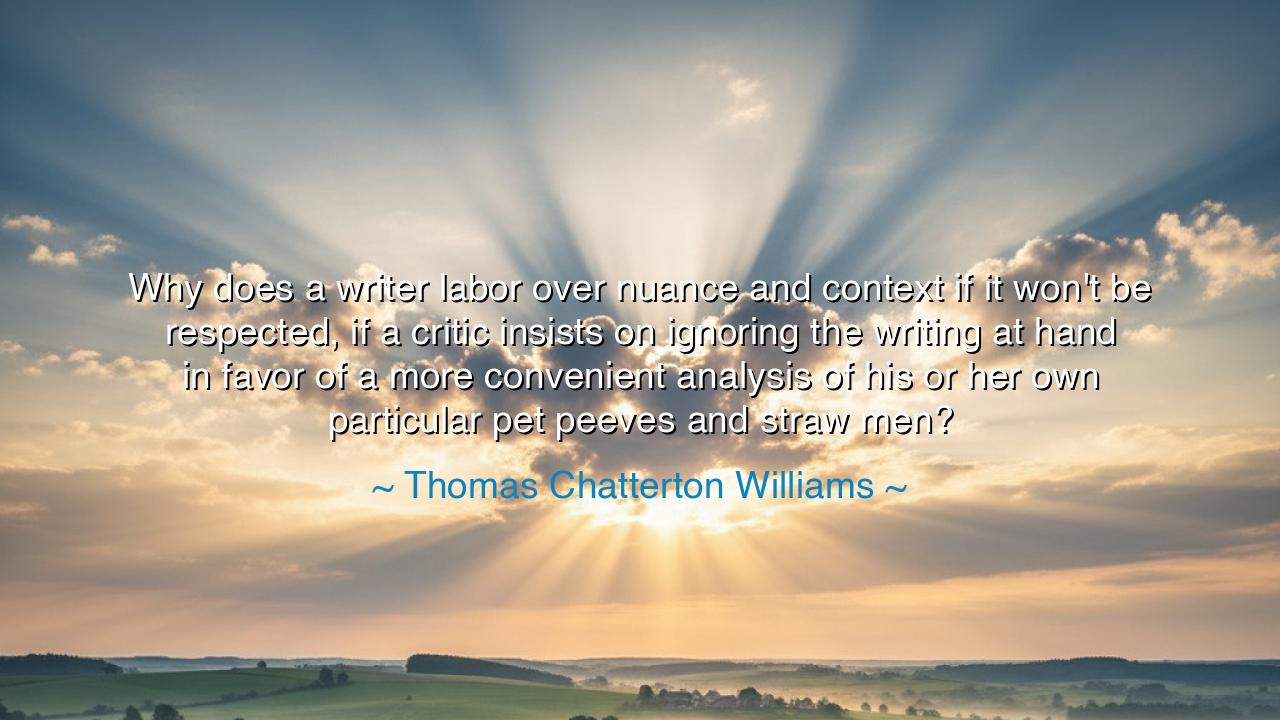
Why does a writer labor over nuance and context if it won't be
Why does a writer labor over nuance and context if it won't be respected, if a critic insists on ignoring the writing at hand in favor of a more convenient analysis of his or her own particular pet peeves and straw men?






When Thomas Chatterton Williams cried out, “Why does a writer labor over nuance and context if it won’t be respected, if a critic insists on ignoring the writing at hand in favor of a more convenient analysis of his or her own particular pet peeves and straw men?” he was giving voice to the agony of all who create. His words are not the complaint of a fragile ego, but the lament of one who knows the sacred weight of language, and who sees it carelessly dismissed by those who prefer their own quarrels to the truth of the text before them. In this quote, he defends not only his own craft, but the very dignity of the written word.
The meaning here is sharp and urgent: to write with nuance and context is to labor with care, to shape words so that they carry truth delicately, balancing shades of meaning, avoiding distortion. It is a labor of love, of discipline, and of reverence for clarity. Yet when a critic turns away from this careful architecture, choosing instead to attack a caricature or a straw man, the writer’s effort is dishonored. The critic, rather than engaging the text, engages only with his own shadow-fight, ignoring the living voice of the work. Williams’ question is thus both despair and challenge: what use is honest writing if it is never honestly received?
History offers us countless examples of this struggle. Think of Socrates, who sought truth through dialogue, always pressing for precision, for nuance. Yet he was condemned not for his actual teaching, but for the distorted accusations of his opponents, who found it easier to accuse him of corrupting youth and inventing new gods than to reckon with his questions. The trial of Socrates is one of the earliest examples of what Williams calls the “straw man”—a false target erected to replace the difficult truth of the argument at hand. In killing Socrates, Athens silenced a man, but in truth condemned itself, for it chose caricature over honest engagement.
The struggle appears again in the life of Galileo Galilei. With patience and brilliance, he wrote of the motions of the heavens, weaving mathematics and observation into a vision of truth. Yet his opponents rarely contended with his nuance. Instead, they condemned him for challenging tradition, crafting false accusations to avoid confronting the evidence itself. Like the critics of whom Williams speaks, they preferred the safety of their own prejudices to the risk of genuine understanding. Thus the writer’s careful craft was reduced to noise, his context ignored in favor of convenience.
Williams’ words also reveal a deeper truth about the critic. The critic is necessary, for in every age the writer needs one who will test his ideas. But when the critic abandons honesty for self-indulgence—when he allows his pet peeves to guide his judgment—he ceases to be a partner in truth and becomes instead a destroyer of meaning. Such critics may gain applause, but they do so at the expense of wisdom. They wound not only the writer, but the entire public, for they prevent the audience from hearing the real voice of the text.
The lesson is this: whether as writer, critic, or reader, one must be faithful to the truth of the words before them. Writers must continue to labor with nuance, even knowing their work may be misunderstood, for truth is worth the struggle. Critics must discipline themselves to read fairly, resisting the temptation to fashion straw men for easy victory. Readers must guard against the laziness of accepting distortions, choosing instead to enter the text with humility and patience. Only then can literature serve its true purpose: to bring clarity to the human condition.
In practical action, this means: if you write, write honestly, and trust that even if some distort you, others will understand. If you critique, critique with fairness—ask whether you are confronting the argument as it truly stands, or one of your own invention. And if you read, read deeply—resist the easy caricature, and seek the heart of what the author meant. In this way, the chain of communication remains unbroken: writer, critic, and reader united in pursuit of truth.
Thus, the cry of Thomas Chatterton Williams is not only a defense of his own work, but a warning for all time: do not let pet peeves or straw men obscure the labor of thought. Respect nuance; honor context. For in every word carefully chosen, there lies the possibility of wisdom—and when we distort or dismiss it, we lose not only the writer’s gift, but our own chance to see more clearly the world we share.






AAdministratorAdministrator
Welcome, honored guests. Please leave a comment, we will respond soon